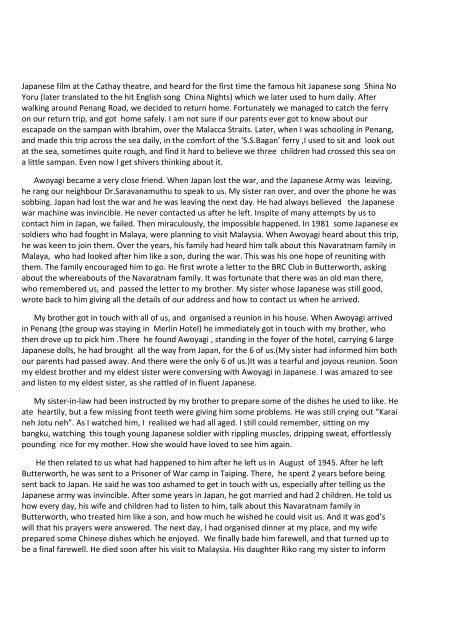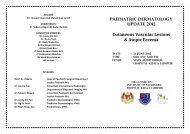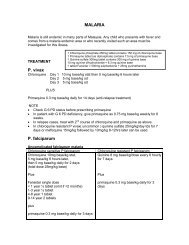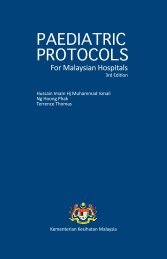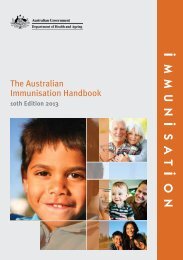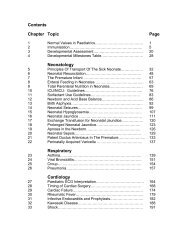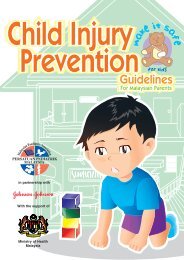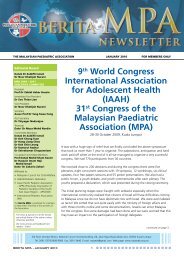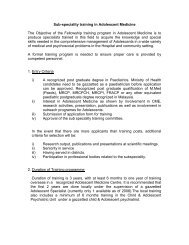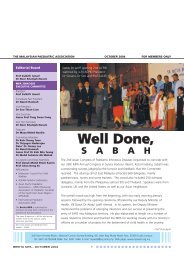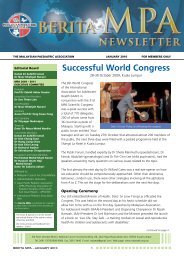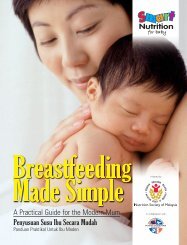Japanese Occupation- Dato' Param.pdf - Malaysian Paediatric ...
Japanese Occupation- Dato' Param.pdf - Malaysian Paediatric ...
Japanese Occupation- Dato' Param.pdf - Malaysian Paediatric ...
Create successful ePaper yourself
Turn your PDF publications into a flip-book with our unique Google optimized e-Paper software.
<strong>Japanese</strong> film at the Cathay theatre, and heard for the first time the famous hit <strong>Japanese</strong> song Shina No<br />
Yoru (later translated to the hit English song China Nights) which we later used to hum daily. After<br />
walking around Penang Road, we decided to return home. Fortunately we managed to catch the ferry<br />
on our return trip, and got home safely. I am not sure if our parents ever got to know about our<br />
escapade on the sampan with Ibrahim, over the Malacca Straits. Later, when I was schooling in Penang,<br />
and made this trip across the sea daily, in the comfort of the ‘S.S.Bagan’ ferry ,I used to sit and look out<br />
at the sea, sometimes quite rough, and find it hard to believe we three children had crossed this sea on<br />
a little sampan. Even now I get shivers thinking about it.<br />
Awoyagi became a very close friend. When Japan lost the war, and the <strong>Japanese</strong> Army was leaving,<br />
he rang our neighbour Dr.Saravanamuthu to speak to us. My sister ran over, and over the phone he was<br />
sobbing. Japan had lost the war and he was leaving the next day. He had always believed the <strong>Japanese</strong><br />
war machine was invincible. He never contacted us after he left. Inspite of many attempts by us to<br />
contact him in Japan, we failed. Then miraculously, the impossible happened. In 1981 some <strong>Japanese</strong> ex<br />
soldiers who had fought in Malaya, were planning to visit Malaysia. When Awoyagi heard about this trip,<br />
he was keen to join them. Over the years, his family had heard him talk about this Navaratnam family in<br />
Malaya, who had looked after him like a son, during the war. This was his one hope of reuniting with<br />
them. The family encouraged him to go. He first wrote a letter to the BRC Club in Butterworth, asking<br />
about the whereabouts of the Navaratnam family. It was fortunate that there was an old man there,<br />
who remembered us, and passed the letter to my brother. My sister whose <strong>Japanese</strong> was still good,<br />
wrote back to him giving all the details of our address and how to contact us when he arrived.<br />
My brother got in touch with all of us, and organised a reunion in his house. When Awoyagi arrived<br />
in Penang (the group was staying in Merlin Hotel) he immediately got in touch with my brother, who<br />
then drove up to pick him .There he found Awoyagi , standing in the foyer of the hotel, carrying 6 large<br />
<strong>Japanese</strong> dolls, he had brought all the way from Japan, for the 6 of us.(My sister had informed him both<br />
our parents had passed away. And there were the only 6 of us.)It was a tearful and joyous reunion. Soon<br />
my eldest brother and my eldest sister were conversing with Awoyagi in <strong>Japanese</strong>. I was amazed to see<br />
and listen to my eldest sister, as she rattled of in fluent <strong>Japanese</strong>.<br />
My sister-in-law had been instructed by my brother to prepare some of the dishes he used to like. He<br />
ate heartily, but a few missing front teeth were giving him some problems. He was still crying out “Karai<br />
neh Jotu neh”. As I watched him, I realised we had all aged. I still could remember, sitting on my<br />
bangku, watching this tough young <strong>Japanese</strong> soldier with rippling muscles, dripping sweat, effortlessly<br />
pounding rice for my mother. How she would have loved to see him again.<br />
He then related to us what had happened to him after he left us in August of 1945. After he left<br />
Butterworth, he was sent to a Prisoner of War camp in Taiping. There, he spent 2 years before being<br />
sent back to Japan. He said he was too ashamed to get in touch with us, especially after telling us the<br />
<strong>Japanese</strong> army was invincible. After some years in Japan, he got married and had 2 children. He told us<br />
how every day, his wife and children had to listen to him, talk about this Navaratnam family in<br />
Butterworth, who treated him like a son, and how much he wished he could visit us. And it was god’s<br />
will that his prayers were answered. The next day, I had organised dinner at my place, and my wife<br />
prepared some Chinese dishes which he enjoyed. We finally bade him farewell, and that turned up to<br />
be a final farewell. He died soon after his visit to Malaysia. His daughter Riko rang my sister to inform


